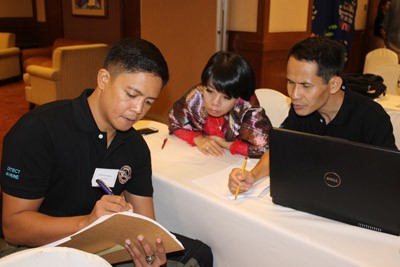
For Immediate Release
CEBU, PHILIPPINES, August 1, 2014 – Marine law enforcement officers from 10 countries gathered in the Philippines July 28-August 1, 2014 to begin an unprecedented regional cooperative training effort to counter the illegal smuggling of endangered and protected marine wildlife.
The group, the Marine Special Investigation Group (SIG) includes participants from Australia, Indonesia, Palau, the Philippines, South Korea, the Solomon Islands, Thailand, the U.S. and Vietnam. This training is an outcome of the APEC Pathfinder Dialogue that was held in Bangkok last September, where over 150 participants from APEC, ASEAN, and the Pacific Island Forum, policy makers, law enforcement officials, NGOs, and international organizations convened to discuss corruption that facilitates illicit trade in wildlife trafficking, money laundering, and trafficking in persons.
Sea turtles, whales, dolphins, sharks and many other endangered marine species are being illegally and inhumanely captured in alarming numbers. These species are then trafficked to meet demand for food and traditional medicine at markets mostly located in Southeast Asia and China.
Open marine borders, low penalties, and vast expanses exacerbate the problem and provide an easy target for poachers. The Marine SIG training seeks to provide countries in the region with the tools they need to deter and prosecute the criminal syndicates involved in trafficking marine species.
With Coast Guard, Customs, fisheries agencies, police, and prosecutors coming together from key countries to share information, law enforcement is now better equipped to tackle the criminal syndicates that are exploiting weak laws and limited law enforcement capacity to plunder the ocean’s dwindling populations.
A leading partner to the Marine-SIG, Chief Superintendent Ferdinand Yuzon of the Philippine National Police (PNP) National Directorate said, “The Marine SIG served as an excellent opportunity to help raise the awareness of key law enforcement officers about the poaching and trafficking of endangered marine wildlife in the region. I see this as an exciting beginning to on-going collaboration aimed at combatting the illegal trade in marine wildlife”. The Philippines is an active member of the ASEAN Wildlife Enforcement Network (ASEAN-WEN), an integrated ASEAN enforcement body composed of environment, police and customs officials fighting to combat wildlife and marine resources trafficking in Southeast Asia. The Philippines is hosting the 1st Regional Marine SIG with U.S. Government agencies and ASEAN-WEN partners, and chaired the Network from 2010-2011.
The Marine SIG was modelled after the highly-successful 2013 “Operation Cobra” which demonstrated unprecedented cooperation among law enforcement agencies in Africa, Asia, and the United States and resulted in huge seizures of illegal wildlife and wildlife products including elephant ivory and rhino horn, and arrests of wildlife trafficking syndicate members.
Freeland, a counter-trafficking organization based in Bangkok, Thailand organized the training event with financial support from the U.S. Department of State’s Bureau of International Narcotics and Law Enforcement Affairs (INL) and the U.S. Agency for International Development (USAID)-funded Asia’s Regional Response to Endangered Species Trafficking (ARREST) Program.
Freeland, the implementing partner of the ARREST Program, will continue to work closely with INL and USAID to support the Marine SIG and shut down the criminal syndicates profiting from destroying marine ecosystems.







Comment
Make a general inquiry or suggest an improvement.